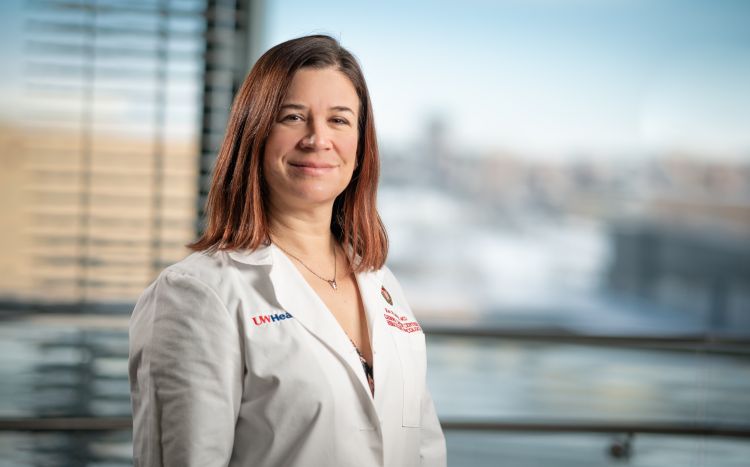Women in Medicine: Kari Wisinski, MD

The American Medical Association recognizes September as Women in Medicine Month, honoring the significant contributions of women to the field of health care.
Throughout the month, the Department of Medicine will feature Q&As with a handful of our own women physicians across a variety of specialties and at different stages in their careers.
Kari Wisinski, MD, is the Endowed Professor of Hematology and Oncology and division chief, Hematology, Medical Oncology and Palliative Care. As a clinician and researcher she focuses on breast cancer treatment.
How has being a woman shaped your career in medicine?
I will focus on how being a mom of three has shaped my career.
Prioritizing my family and career were both very important to me. There have been times when one has been placed ahead of the other, like on a busy inpatient week or family vacations, but having both as clear priorities at all times has really helped me remain focused on the important things. Plus, my family helps me get away emotionally, especially after a hard day and working in oncology reminds me daily to value my time with those I love.
Lastly, I hope that my kids, their friends, and other younger women in medicine see that a successful career with a family is feasible.
Who have been your greatest personal and/or professional mentors as women in medicine, and why?
I was raised on a small Wisconsin family farm with my mom also working as a radiation technologist. She ultimately advanced in her career to managing the technologist team. As I reflect, she has been my largest influence, as she also held both career and family as priorities and truly integrated parenting with her professional growth.
Two key female mentors in oncology were Dr. Gail Eckhart, the Phase I research program lead at Colorado (where I was an internal medicine resident) who influenced my interest in oncology and clinical trials, and Dr. Ruth O’Regan, who sponsored my career as a breast cancer medical oncologist and also believed in my leadership potential.
How has your work as a leader and clinician benefitted women’s health issues?
With my clinical focus on breast cancer, each day I get to help women impacted by this difficult diagnosis.
Whether I am helping someone coping with an early-stage diagnosis with a good prognosis but lifelong fear of recurrence, or supporting someone with advanced disease as they approach end of life, it is an incredible privilege.
As a leader in the breast cancer field, I can also influence women impacted by breast cancer by engaging with oncology colleagues across the state and nation to share advances in the field as well as by actively participating in research of new treatment options.
Responses have been lightly edited for length.
Photo credit: Clint Thayer/Department of Medicine.